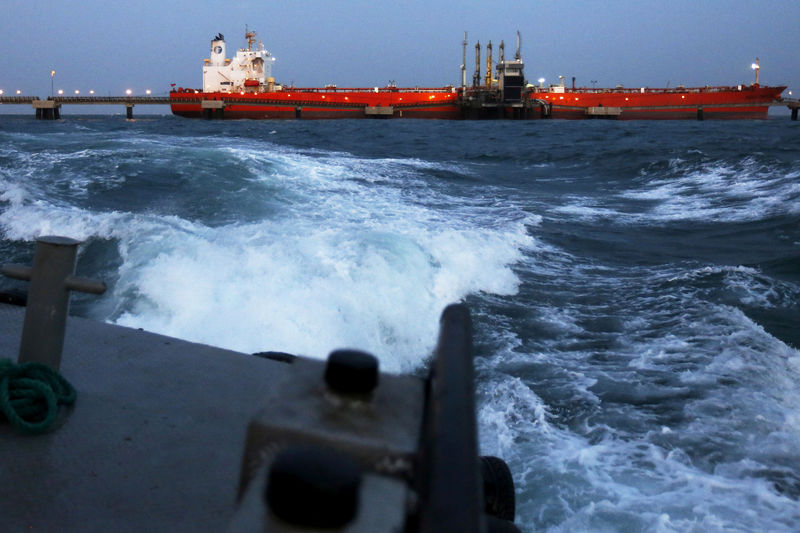By Marianna Parraga and Mircely Guanipa
HOUSTON/PUNTO FIJO (Reuters) - Venezuela's state-run oil company PDVSA has limited the damage from an unprecedented slump in crude exports by transferring oil between tankers at sea and loading vessels in neighboring Cuba to avoid asset seizures.
But the OPEC member nation is still fulfilling less than 60 percent of its obligations under supply deals with customers.
Venezuela has been pumping oil this year at the lowest rate in three decades after years of underinvestment and a mass exodus of workers. The state-run firm's collapse has left the country short of cash to fund its embattled socialist government and triggered an economic crisis.
PDVSA's problems were compounded in May when U.S. oil firm ConocoPhillips (N:COP) began seizing PDVSA assets in the Caribbean as payment for a $2 billion arbitration award. An arbitration panel at the International Chamber of Commerce (ICC) ordered PDVSA to pay the cash to compensate Conoco for expropriating the firm's Venezuelan assets in 2007.
The seizures left PDVSA without access to facilities such as Isla refinery in Curacao and BOPEC terminal in Bonaire that accounted for almost a quarter of the company's oil exports.
Conoco's actions also forced PDVSA to stop shipping oil on its own vessels to terminals in the Caribbean, and then onto refineries worldwide, to avoid the risk the cargoes would be seized in international waters or foreign ports.
Instead, PDVSA asked customers to charter tankers to Venezuelan waters and load from the company's own terminals or from anchored PDVSA vessels acting as floating storage units.
The state-run company told some clients in early June it might impose force majeure, a temporary suspension of export contracts, unless they agreed to such ship-to-ship transfers.
PDVSA also requested the customers stop sending vessels to its terminals until it could load those that were already clogging Venezuela's coastline.
Initially, customers were reluctant to undertake the transfers because of costs, safety concerns and the need for specialist equipment and experienced crew.
But PDVSA has managed to export about 1.3 million barrels per day (bpd) of oil since early July, up from just 765,000 bpd in the first half of June, according to Thomson Reuters data and internal PDVSA shipping data seen by Reuters.
That was still 59 percent of the country's 2.19 million bpd in contractual obligations to customers for that period, and some vessels are still waiting for weeks in Venezuelan waters to load oil.
There were about two dozen tankers waiting this week to load over 22 million barrels of crude and refined products at the country's largest ports, according to Reuters data.
"We are not tied to one option or a single loading terminal," PDVSA President Manuel Quevedo said on Tuesday of the company's exports. "We have several (terminals) in our country and we have some in the Caribbean, which of course facilitate crude shipping to fulfill our supply contracts."
CUBAN CONNECTION
PDVSA has also used a route through Cuba to ease the impact of the Conoco seizures. That route is for fuel rather than crude.
The Venezuelan company has used a terminal at the port of Matanzas as a conduit mostly for exporting fuel oil, according to two people familiar with the operations and Thomson Reuters shipping data. Venezuela's fuel oil is burned in some countries to generate electricity.
Two tankers set sail from the Matanzas terminal for Singapore between mid-May and early July, Reuters data showed. Each ship carried around 500,000 barrels of Venezuelan fuel, Reuters data shows.
In recent months, Venezuela has been shipping fuel to Matanzas in small batches, according to the data.
PDVSA and Cuba's state-run oil firm Cupet have used Matanzas to store Venezuelan crude and fuel in the past but exports from the terminal to Asian destinations are rare.
That is in part because vessels that use Cuban ports cannot subsequently dock in the United States due to the U.S. commercial embargo on Cuba.
Cupet did not respond to requests for comment.
PDVSA has also used ship-to-ship transfers to fulfill an unusual supply contract it has with Cuba's Cienfuegos refinery.
The refinery dates from the 1980s - when Cuba was a close ally of the Soviet Union during the Cold War - and the facility was built to process Russian crude.
PDVSA typically uses its own or leased tankers to bring Russian crude from storage in the nearby Dutch Caribbean island of Curacao to Cienfuegos. But it is now discharging the imported Russian oil at sea in Cayman Islands' waters via these seaborne transfers.
ConocoPhillips last month ratcheted up its collection efforts by moving to depose officials from Citgo Petroleum, PDVSA's U.S. refining arm, arguing it had improperly claimed ownership of some PDVSA cargoes.
Citgo declined to comment.

ConocoPhillips is also preparing new legal actions to get Caribbean courts to recognize its International Chamber of Commerce arbitration award. If it succeeds in those efforts, it would be able to sell the assets to help satisfy the ruling.